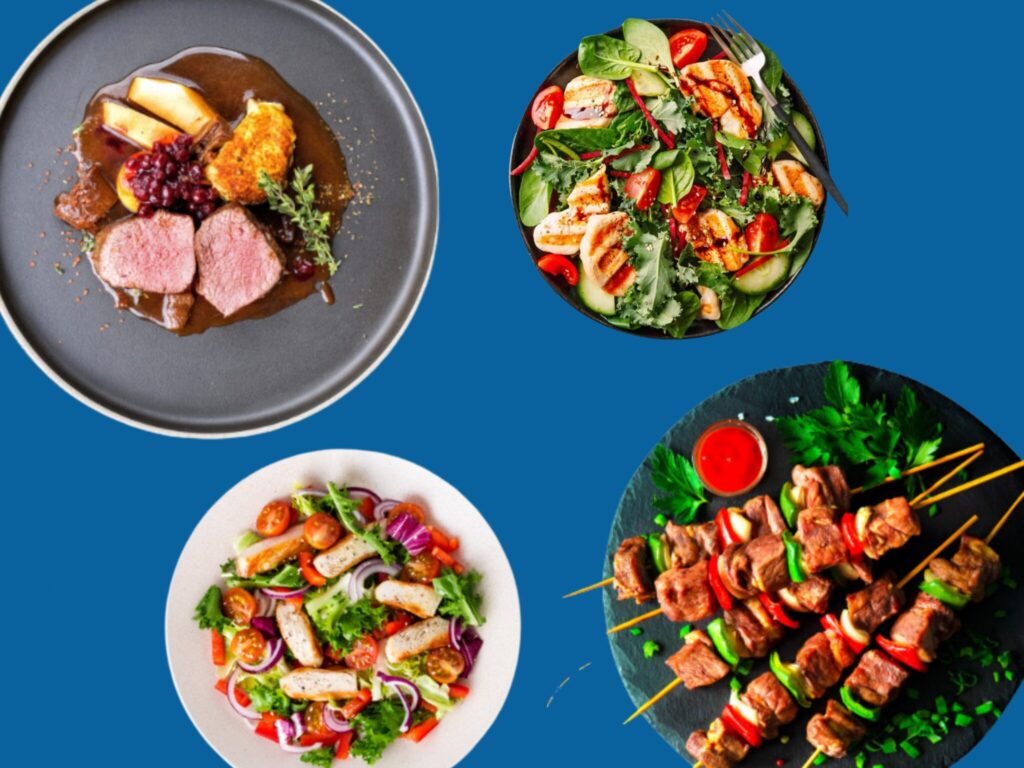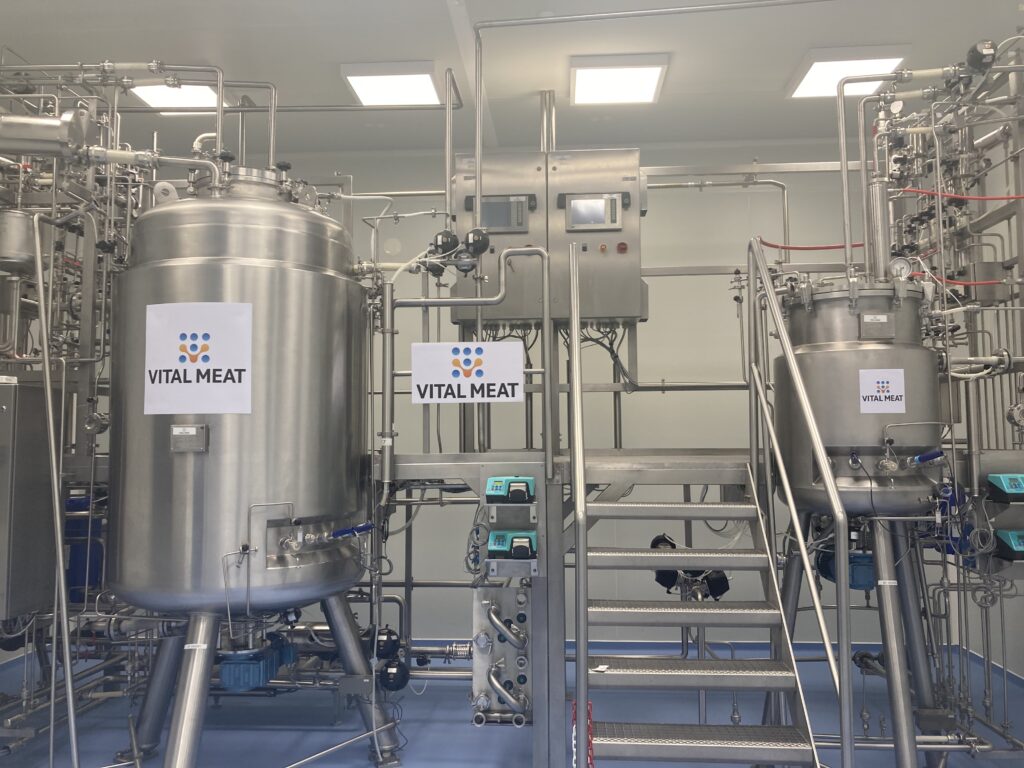Vital Meat Files for UK Regulatory Approval of Cultivated Chicken, Targets 2025 Launch
6 Mins Read
French startup Vital Meat has submitted a dossier to food regulators in England and Scotland for its cultivated chicken, a process that’s expected to take 18 to 24 months.
France’s Vital Meat, which makes cultivated chicken as a B2B ingredient for hybrid meats, has applied for regulatory approval in the UK, making it one of only a handful of companies to do so.
The startup has submitted a novel food dossier to the Food Standards Agency (FSA) and Food Standards Scotland, whose scientists and experts will now assess the application in a process expected to last 18 months to two years.
The development comes six months after the cultivated chicken player filed for approval in Singapore too, with the green light from its regulator thought to be imminent.
“We can’t wait to start commercialisation in Great Britain; chicken is one of the most consumed meat over there,” said Vital Meat co-founder and CEO Etienne Duthoit. “We are now preparing our launch in 2025 and looking for food partners.”
Why Vital Meat chose the UK

Vital Meat, which uses pharmaceutical technology to transform cells from fertilised chicken eggs into cultivated meat, expects to receive regulatory clearance in Singapore by the end of the year. “We are going through the questions and answers process with scientific experts from SFA and so far, the discussion is very smooth and is going well,” said Claude Rescan, the startup’s regulatory expert.
The company suggests this puts it “in the running” to be the first European startup to be approved for sale in the city-state, although Dutch cultivated pork producer Meatable is anticipating the go-ahead shortly.
“We are very confident and are already collaborating with a Singaporean chef as well as food companies to prepare for the market launch as soon as the approval is granted,” said Duthoit. This year, Singapore has already granted approval to Australia’s Vow, whose cultivated quail is now being unveiled at restaurants. And just last week, Eat Just (the world’s first company to be allowed to sell cultivated meat back in 2020, also in Singapore) introduced its Good Meat chicken in the freezer at Huber’s Butchery, marking the global retail debut of cultivated meat.
“The decision to expand into the UK swiftly follows our Singaporean endeavour. Asia, and particularly Singapore, is an important market for us with consumers that are open to new foods and a business ecosystem open to innovation,” said Vital Meat COO Olivia de Talancé.
As it awaited the SFA’s decision, Vital Meat wanted to expand to another market. It chose the UK due to its citizens’ pragmatism and climate consciousness aligning well with the sustainability aspects of cultivated meat, alongside their receptiveness to innovation and awareness around health.
But plenty of work needs to be done if manufacturers are to convince Brits to eat cultivated meat. A survey by the FSA in 2022 revealed that while 78% of consumers had heard of these proteins, only 34% would be willing to try them. Only three in 10 perceived cultivated meat to be safe to eat, and 42% said nothing would encourage them to consume these products. However, 27% would change their minds if they knew they were safe to eat, and 23% would do so if they could trust that they’re properly regulated.
Rapid progress for cultivated meat in the UK

Vital Meat’s UK application is the latest development in a fast-moving sector. For years, the FSA was criticised for having a slow novel foods regulation process, which it inherited from the UK post-Brexit. But lately, things have begun to shift, and fast.
The regulator is seeking state investment to create labs for sandbox testing of novel foods, with an eye on the £5M scheme announced by UK chancellor Jeremy Hunt last autumn. In January, it was reported that the FSA has launched a survey asking manufacturers when they plan to submit applications for cultivated meat products, and what technologies they may be using. This followed a 2023 Deloitte study it commissioned, which suggested that speeding up novel foods regulation could help the UK meet its carbon reduction plans (it aims to reach net zero by 2050).
In March, the FSA agreed on plans to fast-track the commercialisation of novel foods. It said it would create a new public register of regulated products, replacing the current system that requires the parliament to pass statutory instruments before they can be placed on the market. This added up to six months to the process, which at the time took up to two-and-a-half years.
The FSA will also remove the requirement for products that have already been approved to reapply for clearance every 10 years. The reforms mean it will now take up to two years to approve cultivated meat for human consumption in the UK, as the new framework still requires thorough, evidence-based assessments of safety and nutrition.
Around the same time, British cultivated meat startup Meatly said it was expecting to receive the greenlight from the FSA within three months – but this is a chicken product for pets, not human consumption. Of producers working on the latter, only Israel’s Aleph Farms has publicly announced filing a dossier to the UK regulator (back in August). Dutch pioneer Mosa Meat, meanwhile, has laid out its intention to do the same.
Meanwhile, Vital Meat’s home country, France, is looking to ban the production and sale cultivated meat within national borders. “The topic of cultivated meat is generating a lot of discussion in France, as it is in other countries, and this is understandable,” Camille Chevalier, communications manager at Vital Meat, told Green Queen. “It represents a significant culinary revolution. We are optimistic that, after thorough debates and exchanges, cultivated meat will be eventually approved in Europe and accepted in France.”

Vital Meat partnered with cell culture media producer BioWest last year, whose customised serum-free media for Vital Meat allows the latter to manufacture its cultivated chicken in 250-litre bioreactors, capable of producing several kgs of product at a time.
The startup is also producing at its pilot facility near Nantes, which runs 2,000-litre bioreactors on a daily basis. “With each production, we are seeing significant cost improvements. It is very encouraging,” said Chevalier. “We are confident to get to price parity in a few years.”
Cost is a crucial entry barrier for cultivated meat. and it’s why Vital Meat is choosing the hybrid approach, making cultivated chicken for manufacturers that can mix it with plant-based ingredients, instead of marketing a fully developed cut itself. Investors say this approach is the only way cultivated meat can be commercially viable in the near term – it’s the same reason why Eat Just’s latest Good Meat chicken comprises 97% plant-based ingredients.
“Our team has created a high-quality cultivated chicken that will be used as a delicious source of protein to create hybrid products. We are collaborating with top-notch food companies that are experts in crafting alt-meat products. This will allow us to get faster to market, at an affordable price,” Chevalier said, adding “Our product is a cultivated chicken batter that is versatile and easy to incorporate into various recipes.”
Speaking about the UK application, de Talancé remarked: “Health is of paramount importance to us. We are committed to not using antibiotics, or any other controversial ingredient, such as fetal bovine serum or any other animal product. That’s why we are confident that our commitment to safety and sustainability will be rewarded.”
In 2022, a 1,000-person poll suggested that 35% of UK consumers are open to trying a hybrid burger. Vital Meat, which plans to introduce white fish and pork in the future, will hope to build on these results soon.
This story was updated to include Camille Chevalier’s comments.




